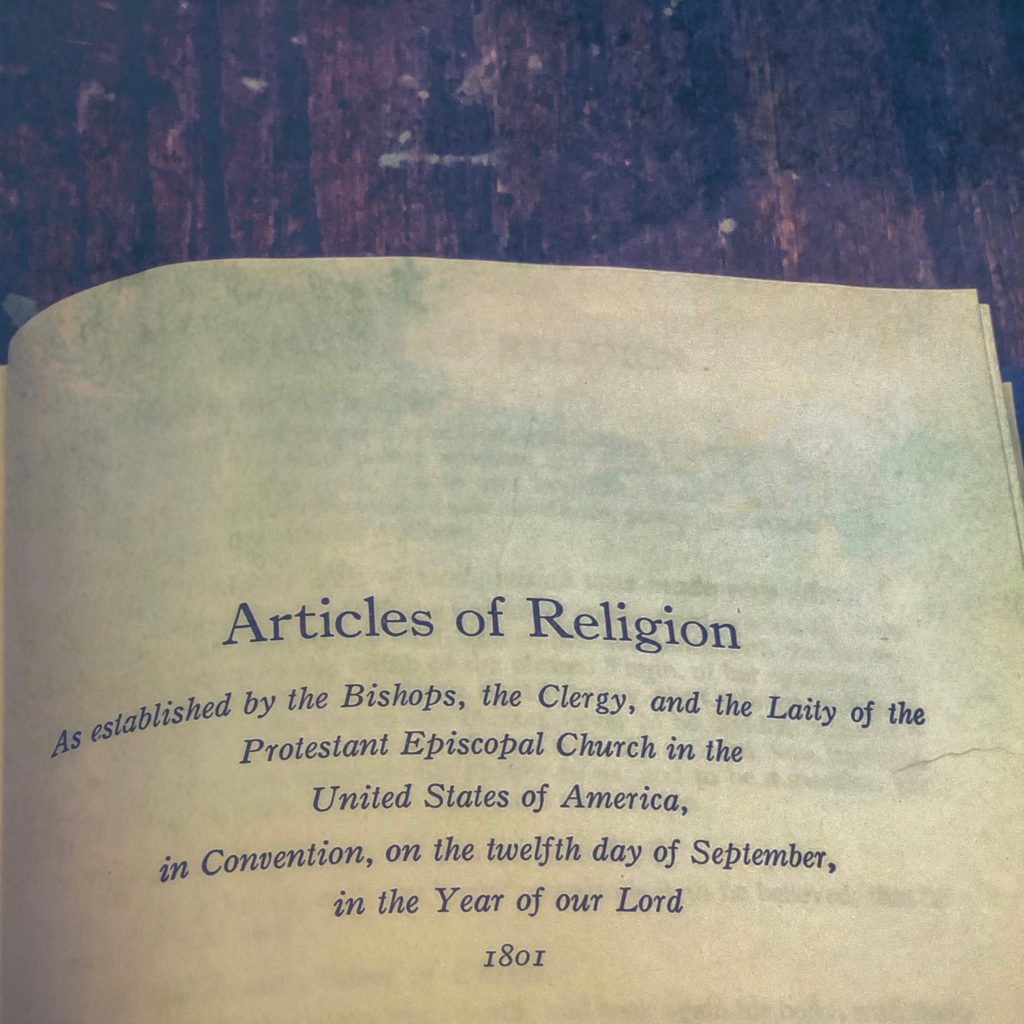
Works done before the grace of Christ, and the Inspiration of his Spirit, are not pleasant to God, forasmuch as they spring not of faith in Jesus Christ; neither do they make men meet to receive grace, or (as the School-authors say) deserve grace of congruity: yea rather, for that they are not done as God hath willed and commanded them to be done, we doubt not but they have the nature of sin.
by Elisabeth Kincaid
Article XIII raises the question of the value of works prior to or without justification. In other words, can non-Christians do good things? There are two approaches which the article considers. First, while it is clear that works cannot strictly merit justification, can they do so congruously, or, in other words, relative to a pre-defined unequal relationship? Do they prepare us to receive grace in some way or do they even make it fitting that we receive justification, even though justification is not strictly earned? Secondly, are these works, considered in themselves, pleasant to God or sinful? So, like the good works done after the receipt of grace, do they have some moral value, even if they are not salvific? The answer of the Article XIII to both of these questions is no.
At first, the use of a number of technical terms and the reference to scholastic debates may make Article XIII appear too abstract and irrelevant for contemporary theological questions and concerns. However, this question in fact touches on two key theological concerns which are equally relevant today: ecumenism and interfaith engagement. Because of the reference to the schoolmen (a reference to the Roman Catholic theologians of the various schools scattered throughout Europe which in Reformation debates often carried derogatory implications) this article especially presents itself as a challenge to ecumenical dialogue. Secondly this article challenges us to consider how we discuss the actions of the unbaptized, making it important for engagement with those of different faiths and the “nones.” Although these do raise challenging questions, I will argue in this blog post that reading this article along with St. Thomas Aquinas provides an interpretive lens which both assuages contemporary concerns and anxieties while also providing an interpretation in accord with the tradition of the church.
I will begin with the simpler question relating to ecumenism. On its face, the reference to the schoolmen should most likely be read as an assumption regarding a deep theological divide with the Roman Catholic Church on the nature of the works of the unbaptized. Are these works required to make people “meet,” in other words suitable or fitting, to receive grace? Or do people merit grace congruously?
In the scholastic debates, two types of merit were recognized. First, there is condign merit, which describes that which is merited in strict justice as a reward. Despite Reformation rhetoric regarding faith by works, there was no belief among orthodox Roman Catholic theologians by the time of the Counsel of Trent that any human, on his or her own power, could ever merit grace condignly. This would erase God’s divinity and transcendence, by implying we could make claims on God as if he were our equal. As Aquinas writes: “Now it is clear that between God and man there is the greatest inequality: for they are infinitely apart, and all man’s good is from God. Hence there can be no justice of absolute equality between man and God.”[1] (ST I-II q. 114, a. 2) In other words, we can never through our own works make ourselves suitable to receive God’s grace, because we can never become God or like God. This unbridgeable gap is, or course, what makes grace always God’s free gift, not something we can earn or prepare ourselves for. However, the second question, regarding congruous merit – the subject of Article XIII – was the topic of more actual debate.[2] Aquinas defines congruous merit as a relative merit – specifically that which might be found between a parent and a child. (I-II, q. 114, a.1.) So, while a sinner can never merit absolutely, it might be possible to say that it would be fitting, based on pre-existing relationship, to claim that within the context of the vast disparity of the relationship, the person still merited relatively.
This claim that some merit might accrue relatively for works carried out before receiving grace was in fact argued by some scholastic theologians – hence the reference in the article. Without delving into all the complexities of these complicated theological debates, I think it is worth pointing out that congruous merit earned on behalf of one’s self is not described or assumed either in Aquinas or the canons on justification of the Counsel of Trent. Aquinas, for instance only considers congruous merit as something which might accrue only after justification (not before as this article assumes) since nobody can merit eternal life on their own. Rather, it only a possibility after the parent/child relationship has been established between God and the Christian, not as a prerequisite or preparation for justification. Aquinas’s main discussion regarding the grace of congruity is whether, based on the model of Christ’s own atoning sacrifice, a person can merit congruously for another. (I-II q. 114, a. 6). So yes, in God’s great mercy he does give those who have already received sanctifying grace the opportunity to imitate Christ in working on behalf of others, but this is all carried out within the father-child relationship, not outside of it. This engagement with the mission of Christ is an example of God’s further grace to his children, not an attempt to smuggle in some form of works-based salvation, which seems to be the concern of the article.
The second question is more challenging. How do we talk about the moral value of the actions of those not yet baptized? To most contemporary readers of the Thirty-Nine Articles, the idea that the articles claim that the unbaptized always act in a sinful manner will elicit an emotional rejection. Our cultural moment has made us keenly aware of the power and the virtues of those who resist evil for the sake of justice and the common good and selflessly serve others, regardless of their beliefs. To say their actions not only have no moral good, but are in fact sin, seems unnecessarily harsh and inaccurate.
In this question, as in the first, I think Aquinas might be helpful to us in reading this article in a catholic mode which also conforms with our own moral intuitions and experience. Normally, our instinctive reading of something as a being described as a sin is that an action is wrong and lacks any type of moral value: a completely binary read of good and evil. Aquinas offers a more nuanced way to understand action – through the lens of perfection and charity. Aquinas defines sin as a turning away among human “from that in which their last end really consists” i.e. union with God in the beatific vision. ( I-II Q. 1 a. 7, ad 1, I-II Q. 3 a. 8. ) Thus, all action which is properly oriented to its final end stems from love of God. “ However, to say an action is not carried out because of our love of God does not mean that we deny that it has some good, even if it is not perfectly good. First, it has good because everything that has being as some good. It is evil only insofar as it lacks the fulness of perfection. (I-II Q 18 a 1.) Actions which lack perfection are sinful insofar as the will desires what is only “an apparent good: which has indeed some measure of good, but not of a good that is simply suitable to be desired.” (I-II Q 19 , a1 ad 1).
Read through this interpretive lens, to say along with Article XIII that actions which are not stemming from God’s grace, which is what makes the true love of God possible, are sinful is not to deny that they are in many ways richly good, but rather to acknowledge that they lack the fullness of orientation towards love of God.
Of course, making this statement always needs to be accompanied with the humility of acknowledging that to say that the principle of any action does not come from God’s grace does not mean that anybody can ever know which person has received this justifying grace and thus fall into the sin of presumption and limiting the actions of the Holy Spirit, who “blows where the Spirit pleases.” In addition, by acknowledging that these actions oriented by natural loves still have moral value, this approach opens up rich areas of collaboration for Christians working with others to promote the common good and advance justice.
Elisabeth Rain Kincaid is the Assistant Professor of Ethics and Moral Theology at Nashotah House Theological Seminary. She holds a Ph.D. in Theology from the University of Notre Dame and a J.D. from the University of Texas School of Law. Among other publications, she has had articles appear in Political Theology, The Journal of Moral Theology, and Christianity Today. She blogs at https://livingchurch.org/covenant/author/kincaid-elisabeth/.
[1] See Christian D. Washburn, “The Transformative Power of Grace and Condign Merit at the Council of Trent,” in The Thomist Vol 79, 2 (April 2015): 173 – 212. See also Canon I of the Degree on Justification of the Counsel of Trent.
[2] For further discussion see, Heiko Augustinus Oberman, “The Tridentine Decree on Justification in the Light of Late Medieval Theology,” Journal for Theology and the Church 3 (1967): 28-54.
